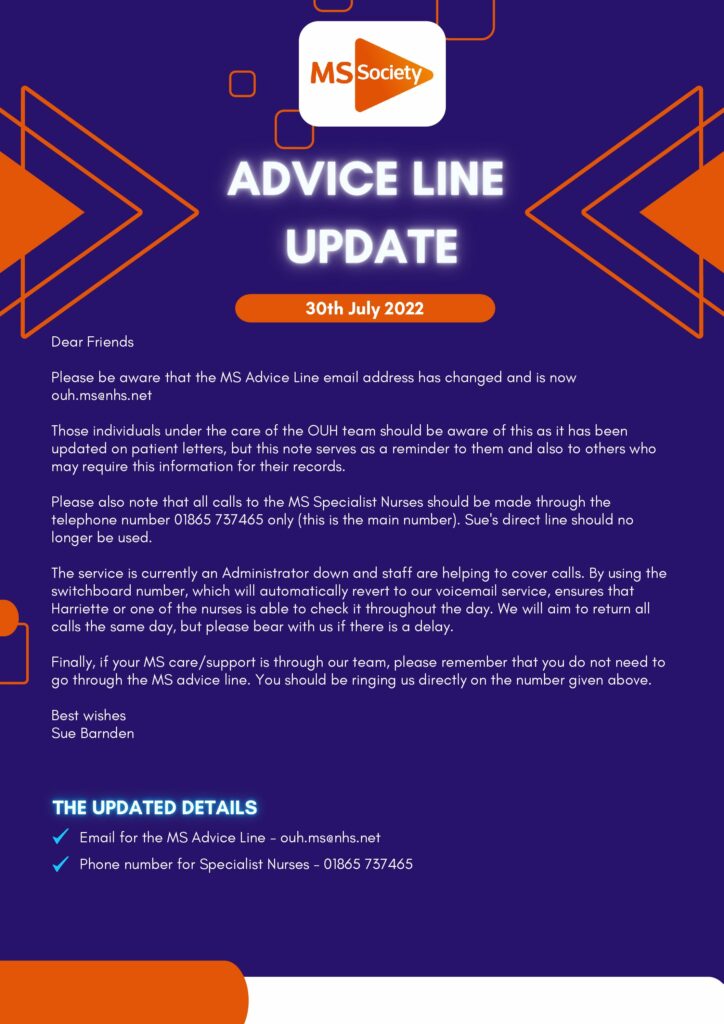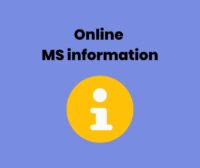Click on the link for info from Sue Barnden re the MS Advice Line and Specialist Nurses team.

Click on the link for info from Sue Barnden re the MS Advice Line and Specialist Nurses team.

July 100 club winners:
Liz Brixey
Dave Webb
Linda Tierney
Sharing prize fund of: £82.50
Please sponsor her on the link below………….
https://www.justgiving.com/fundraising/alisoncdiamond
There is a paper sponsorship form in Reception at the centre for those who do not with to sponsor online.

Alison says; I will be running the 2022 London Marathon and am thrilled to be fundraising for the Oxfordshire MS Therapy Centre. It is a meaningful charity for me to be supporting, because my mother suffered from MS for many years, and I know she would have benefited hugely from having access to the complementary therapies provided here
I took up running 11 years ago, because running a marathon had been on my bucket list of things to do for many, many years! I ran my 1st marathon in New York City in 2011, and have been an avid runner ever since. I was fortunate to be able to run the London and NYC marathons last year – both experiences were incredible, thanks to the amazing spectators along the way who cheered us the whole time! This year, at London, will see me running my 20th marathon.
However, before I run London, this August will be my greatest running challenge yet – as I will be running 120 miles across the Rockies in Colorado, USA, in 6 days. I’m half excited and half terrified at the same time!
In the meantime, I look forward to visiting the centre this summer to learn more about all the wonderful therapies that take place here.

Dear Friends
We are back in action at last. We held our first Open Day for two years and four months – and what a delight it was to see everyone. It has been a long time, but it was certainly worth waiting for, seeing everyone greeting each other like long-lost friends.
We had a fascinating talk from retired fire officer John Lowe, who took us through the history of firefighting in Oxford. He brought with him plenty of illustrations to show how different generations tackled fires and other emergencies in the city. There were plenty of questions and comments, too, from members, always a good sign that they have enjoyed the talk.
We have been forced to make changes to the way we organise our Open Days to meet new rules and regulations imposed on us by the MS Society, to keep
We were also pleased to welcome back our three therapists – Alison Wiltshire, Neil Lambert and Helen Thorpe – who were kept fully employed while the rest of us sat and chatted over welcome cups of tea. It was, as one member put it, “just like the old days”.
We hope in the near future to be able to appoint an outside caterer and we are making inquiries in several directions. Please let us know if you have ideas who might be willing to help us. We will keep you posted on what progress we make, but in the meantime, please remember to bring your own refreshments.
Our next Open Day will be on Friday, 5th August when we will welcome guitarist Cody, one of our regular and favourite entertainers. Please let Jo Hawtin know if you are coming – and don’t forget to bring your own food and drink!
OPEN DAYS
Many of us have probably forgotten that we were awarded a grant of £8,708 from the National Lottery in 2020 to help run our Open Days.
It was supposed to be spent within a year but, of course, we have had no opportunity to spend any of it because we had to suspend our meetings because of Covid.
Now we are back in business, the money will help us to keep Open Days going without having to dip into our own funds.
We also hope to appoint a caterer to provide lunch for everyone, now that we can’t do it ourselves.
This is proving more difficult than we expected – caterers we have approached are willing to help once a week, but not once a month.
Talking of Open Days, we are always on the lookout for speakers and entertainers. If you know of anyone or any group worth looking at, hearing or listening to, please let John Chipperfield know. We like to make our Open Day programme as varied and interesting as possible, and all ideas will be considered.
Don’t forget – if you are coming to Open Days, please let Jo Hawtin know and remember to bring your lunch with you. We will serve tea and coffee when you arrive and after lunch.
RESEARCH STUDY
A student at Oxford Brookes University is keen to talk to those of us with MS for a research project.
Joni Bousie is investigating physical activity and its potential relationship with chronic pain in MS.
Those taking part will have their walking and movement (gait) analysed and physical activity monitored. They will also be asked to fill in questionnaires.
Joni, who is studying for a degree in medical sciences, writes: “Finding effective treatments for pain in people with MS falls at No 9 in the top 10 research priorities list.
“It is crucial to further our understanding of how pain and physical activity may be linked in those with MS.”
Joni is keen to recruit our members to help in the study – if you would like to take part, please email 19019494@brookes.ac.uk
BEDROOM DRAMA
Congratulations to our former Support Officer, Jamie Inshaw, and his wife Cheryl on the birth of their baby daughter – and what a drama it was!
Grandad John Higgins turned up to mend the boiler at the couple’s home in Milton Keynes and ended up delivering the baby on the bedroom floor.
Cheryl went into labour as he set to work on the boiler, forcing him to break away and with Jamie’s help, bring baby Felicity into the world. The midwife arrived to find all the hard work had been done!
Jamie was our Support Officer for two years before moving to Milton Keynes. We wish the family well with their new arrival.
We are still looking for a new Support Officer. If you know of anyone who could fill the role, please let John Chipperfield or Jo Hawtin know. Meanwhile, if anyone needs a chat or listening ear, please call Dorothy Warner on 01235 554448 or any of our other committee members.
STORE COLLECTIONS
One decision we have to make in due course is how to conduct future collections outside shops and garden centres.
With people increasingly paying remotely instead of with cash, we face the prospect of losing money unless we move with the times.
The MS Society has an arrangement with GoodBox, a company which supplies devices for contactless donations.
However, we are told that the firm is now in financial difficulty and the MS Society has ordered that no new orders should be placed with the firm for the time being.
We have made no decision on these gadgets yet, but we will watch developments closely.
WE NEED YOU!
If you have any stories to tell, written poetry, created paintings and drawings or taken family photographs during the pandemic, send them to John Chipperfield at mjpchipperfield@yahoo.co.uk for inclusion in the next newsletter.
Share your news with the rest of us!
----------------
All views expressed in this newsletter are individual and not necessarily the view or policy of the charity or its supporters.
Together, we can be there for everyone affected by MS
DATES FOR YOUR DIARY
All Open Days take place, 10am-4pm, at Northcourt Centre, Abingdon, OX14 1NS.
Fri. 5th August
Fri. 2nd September
Fri. 7th October Fri. 4th November
Fri. 2nd December
Fri. 3rd February Fri. 3rd March
OPEN DAY – Cody entertains.
Popular singer and guitarist.
OPEN DAY – Jim Nicholson.
His role as Town Crier.
OPEN DAY – The Rebukes Ukulele Band. OPEN DAY – Jeff Rozelaar.
Bagels and Bacon.
OPEN DAY – Diana Woods entertains.
Popular organist and singer.
2023
NO OPEN DAY IN JANUARY.
OPEN DAY – Anthony King.
Life as a Court Judge.
OPEN DAY – Speaker or entertainer to be confirmed.
supporters.
Images from the past – Members make cards and dance, two of the many activities we have enjoyed at Open Days in the past.
HELP AT A GLANCE
MS Society helpline – 0808 800 8000 (Freephone)
MS nurse advice line – 01865 234461
ms.advice@ouh.nhs.uk
(The advice line is an answer machine service monitored 9am-5pm, Mon- Fri)
MS specialist nurse – Sue Barnden
01865 737252 (direct line) 01865 737465 (main office)
Continence (bladder and bowel) nurse – 01865 904303
MS Therapy Centre
37e Milton Trading Park, Abingdon
01235 832023
Carers Oxfordshire – 0845 050 7666
MS resource centre – 0800 783 0518 (Freephone) MS Trust Library & Information Service – 0800 032 3839
NHS Direct – 111
Medical Emergency – 999
OXFORD AND DISTRICT BRANCH OFFICERS – 2021-2022
Group coordinator (Chairman) / Newsletter Editor
John Chipperfield 01865 374877 mjpchipperfield@yahoo.co.uk
Administration volunteer (Secretary / Minutes) Jo Hawtin
01865 373907 jo.hawtin@ntlworld.com
Support Volunteer
Vacant
Fundraising Volunteer
Alan Cusden 01865 723420
alancusden@yahoo.co.uk
Finance volunteer (Treasurer)
Brian Hawtin
01865 373907 brian.hawtin@ntlworld.com
Transport Volunteer
Karen Bellinger 01235 534159
bellingerkaren@hotmail.com
Committee volunteer
Dorothy Warner 01235 554448 14doth@gmail.com
CENTRE REVAMP
Those of us visiting the Northcourt Centre have been impressed by the improvements carried out, both inside and out, during our absence.
Like us, the centre received a Lottery grant (in their case, £10,000) and this will pay for recent and future work. Meanwhile, it has joined the White Horse Community Lottery, in which supporters can win
prizes of up to £25,000 and support local causes at the same time. The Northcourt Centre gets 50 per cent of the ticket money sold on its page, plus 10 per cent goes to other local good causes. To give your support, go to www.WhiteHorseLottery.co.uk and search for Northcourt Centre.
We will have leaflets available at our next Open Days giving full details of how the join, boost your income and help others.
What have you been doing during the coronavirus pandemic?
Tell us your experiences and we’ll let other readers know. Contributions to our quarterly newsletter are always welcome.
Call John Chipperfield on 01865 374877,
write to 3 Lambs Close, Kidlington, Oxon OX5 2YD or send an email to mjpchipperfield@yahoo.co.uk

The UK Government has announced an autumn vaccine booster for Covid-19.
You’re eligible for the autumn Covid vaccine booster if you’re:
The rollout is expected to start from September, but could take several months.
Source: https://www.mssociety.org.uk/care-and-support/coronavirus-care-and-suppo…

Can cladribine slow worsening of arm and hand function in people with advanced MS? The ChariotMS Trial is currently testing if a drug called Cladribine can slow down the worsening of hand and arm function for people with more advanced progressive MS.
There are currently no disease modifying therapies available for people with MS who can’t use their lower limbs at all or can only walk short distances with the help of aids like crutches.
The researchers, led by Professor Klaus Schmierer, are hoping to recruit 200 people and so far less than 50 have signed up.
Can you help?
If you have advanced progressive MS and an EDSS (Expanded Disability Status Scale) score of 6.5 to 8.5 the researchers want to hear from you. EDSS 6.5 – 8.5 means you can’t walk further than 20 meters with two crutches, or are unable to walk at all, but still have some use of your arms and hands.
You have to be 18+ to take part in this trial but there is no upper age limit.
You can live anywhere in the UK. There will be 20 trial sites including locations in London, Belfast, Cardiff and Edinburgh.
To find out more about taking part, email the trial team at chariot@qmul.ac.uk.
You can find out more on the MS Society website (who are helping to fund the research) and by reading this article on Pharmaceutical Technology website: https://www.pharmaceutical-technology.com/analysis/ms/

In this information webinar you will meet Noreen Barker, MS Consultant Nurse from The National Hospital for Neurology & Neurosurgery.
Noreen will:
• explain the different kinds of bladder and bowel symptoms that can occur in MS
• explore how these can be treated and managed
• look at what you can do to help your symptoms
• suggest some further sources of support and information
The webinar takes place online on Thursday 21 July 2022 at 6.30pm
To book your space please click here

This information session with Dr Gretchen Hawley (Physical Therapist and Multiple Sclerosis certified specialist) will focus on the importance of good posture and the link with core strength.
Focusing first on posture, Dr Hawley will take a look on how improving common postural holding patterns in standing and sitting results in better function for daily activities and other benefits such as increased respiratory and bowel function.
She will then take a look at core strength and its relationship with posture, demonstrating engagement and movement-based exercises that will help with core activation and stability. Good core strength results in reduced fatigue, efficiency and improved quality of movement for everyday tasks
Please note the presentation will be recorded and will be available for you to watch again.
There is a suggested donation is £5 for this information session, but you can make a donation of your choosing from £1 to attend.
Session takes place online on 18 July 2022 at 2pm
To sign up, please click here